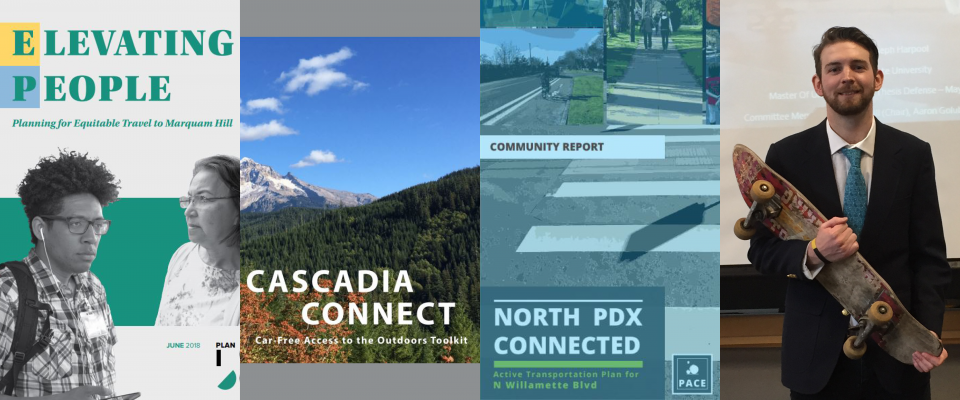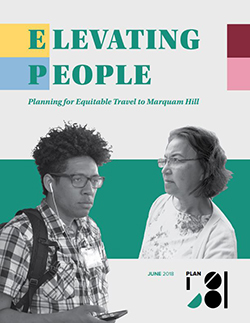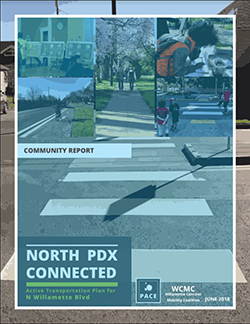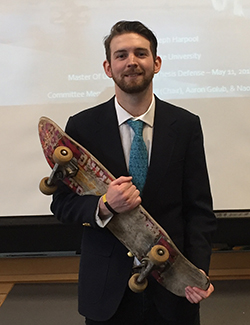The Next Generation of Urban Planners: Graduating PSU Masters Students Tackle Transportation

With the departing class of 2018, we wanted to shine a light on a group of graduating Portland State University (PSU) masters students that focused their studies and expertise on transportation.
Three groups of PSU students finishing the Master of Urban and Regional Planning (MURP) program chose to do workshop projects that tackled a specific transportation issue in the Portland area. Michael Harpool, a graduate of PSU's Master of Urban Studies (MUS) program, wrote his masters thesis on utilitarian skateboarding.
Masters in Urban and Regional Planning(MURP) projects:
 Elevating People: Planning for Equitable Travel to Marquam Hill
Elevating People: Planning for Equitable Travel to Marquam HillElevating People intersects with OHSU’s vision for diversity and inclusion and their goals to reduce single-occupancy vehicle trips and promote the increased use of sustainable multimodal transportation. Oregon Health & Science University (OHSU) is Oregon’s only academic health center and the largest employer in Portland. Plan581, a team of urban planning graduate students at Portland State University, presents the Elevating People plan and its Transportation Equity Lens to help guide OHSU’s future transportation investments. Together, the plan and lens are aimed at improving travel to Marquam Hill by identifying Priority Communities and advancing transportation equity through internal and regional efforts.
MURP Project Group: Plan581 - Reed Brodersen, Jennifer Davidson, Madison Levy, Stephanie Lonsdale, Maria Sipin, and Rob Zoeller
Project Update: In October 2018, this project group received an award for "Special Achievement in Diversity, Equity, and Inclusion" at the 2018 OAPA Annual Planning Conference.
 North PDX Connected: A Community Based Active Transportation Plan for N. Willamette Blvd
North PDX Connected: A Community Based Active Transportation Plan for N. Willamette Blvd
North PDX Connected is an active transportation improvement plan for North Portland focusing on the N Willamette Blvd corridor. Based in community input, the plan seeks to improve safety and comfort for people walking, biking, and taking transit along the corridor and to ensure equitable engagement and distribution of impacts. The team chose to focus on three groups who are commonly excluded from public decision-making processes: People of Color, people with low incomes, and Youth. Focus groups and interviews with community-based organizations helped the team gather perspectives from these communities. The enhanced corridor will help connect neighborhoods in North Portland to each other and to the rest of the city.
MURP Project Group: Pace Planning - Taylor Campi, Mohammad N Hotak, Héctor Rodríguez Ruiz, Leeor Schweitzer, and Mike Serritella.
 Cascadia Connect: Car-Free Access to the Outdoors
Cascadia Connect: Car-Free Access to the OutdoorsWorking with Oregon Department of Transportation (ODOT) and Travel Oregon, as well as number of other partners, Oxbow Consulting created the Car-Free Access to the Outdoors Toolkit. The toolkit serves as a guide for ODOT, members of the recreation industry, transit providers, and land managers who are considering implementing or improving transit or other car-free modes of transportation to outdoor recreation areas. This toolkit is a collection of policies, strategies, and other solutions to help transportation agencies and land managers plan and implement car-free solutions to outdoor recreation areas. Taken together, these tools demonstrate how car-free service to the outdoors is not just feasible, but also can be economically sustainable, efficient, environmentally responsible, and equitable.
MURP Project Group: Oxbow Consulting: Mari Valencia, Kara Boden, Matt Gray, Tony Lamb, Brandon Crawford and John Whitman.
Masters of Urban Studies (MUS) Thesis:
 Utilitarian Skateboarding: Insight into an Emergent Mode of Mobility
Utilitarian Skateboarding: Insight into an Emergent Mode of Mobility
Final Thesis (PDF)
Michael Harpool examined the potential of skateboarding and other alternative modes of mobility as an untapped potential for healthy and sustainable travel. His analysis of nationally-focused online survey results and interviews with local skateboarders in Portland, Oregon provides insight into the motivations and barriers of traveling by skateboard, and the demographics and perceptions of utilitarian skateboarders. His research contributes to a small, but emerging pool of studies on skateboarding as a form of transportation. In June 2018 Harpool also gave a Friday Transportation Seminar presentation on this research, for which recorded video and slides are available.
To see more MURP projects from Portland State University students, check out the MURP project archive page.
The Transportation Research and Education Center (TREC) at Portland State University is home to the National Institute for Transportation and Communities (NITC), the Initiative for Bicycle and Pedestrian Innovation (IBPI), and other transportation programs. We produce timely, practical research for transportation decision makers and support future professionals through curriculum development and student research.
